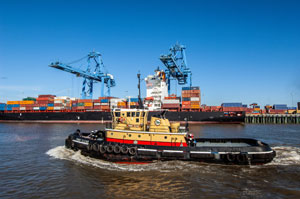As the maritime industry swings into the fifth month of the COVID-19 pandemic, the Port of New Orleans and the three pilot associations guiding ships on the Mississippi River between Southwest Pass and Baton Rouge continue to operate as normal — but with strict CDC, Coast Guard and in-house protocols regarding hygiene and crew oversight to prevent the transmission of coronavirus.
The port’s tugboat companies are on much the same footing.
“As far as ship traffic is concerned, we have only seen about a 5 percent drop-off for March/April 2020 versus March/April 2019,” said Scott Slatten, president of Bisso Towboat. He said the decline was not as severe as at some other ports because of the diversity of cargo handled in the Port of New Orleans (Port NOLA).
Slatten attributed the dip in tug activity to the tanking of the oil market and fewer large tankers calling on the port.
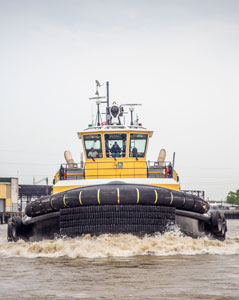 |
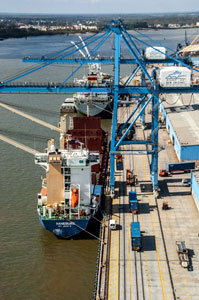 |
|
|
The 92-foot Mardi Gras delivers nearly 5,500 horsepower for Crescent Towing’s biggest jobs, courtesy of a pair of GE Tier 3 main engines linked to Rolls-Royce z-drives. |
The boxship Haneburg waits to take on cargo at the Napoleon Avenue Container Terminal. Despite global supply chain challenges, container vessel calls at Port NOLA rose from 129 in the first quarter of 2019 to 138 in 2020. |
Bisso’s crews are essentially quarantined to their specific tugs with no fraternization among crews. Crewmembers with flu-like symptoms or who have had contact, or presumed contact, with infected people are ordered to undergo home quarantine for a minimum of 14 days. The tugs and office are closed to visitors and contractors, and office hours have been reduced.
“COVID-19 has caused more work for our crews and office workers, as extra precautions have been taken regarding personal hygiene and daily sanitization of the tugs, and social distancing while both on the tug and between tug crews,” Slatten said.
Since mariners are considered essential workers, they have kept commerce moving on the river and “literally have not missed a beat,” even with the past three months of high water, he said.
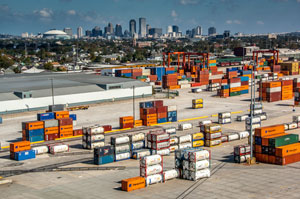 |
|
The city skyline rises beyond stacked cargo at the terminal. |
“Our employees have done a great job in following all the proper CDC/Bisso protocols and guidelines, which went a long way in permitting us to continue operating as efficiently and normal as can be expected in these abnormal times,” Slatten added.
Keith Kettenring, executive vice president and chief operating officer at Crescent Towing, said the company and Cooper/T. Smith Mooring also have continued to operate normally, moving needed supplies in the ports of New Orleans, Mobile, Ala., and Savannah, Ga.
Kettenring emphasized that Crescent’s employees understand their roles and have performed very well during the pandemic. He said that tug operators and line handlers are exposed to high-water conditions, poor visibility or mechanical breakdowns every day.
“COVID-19 is another potential risk that we must mitigate and avoid as our operations continue seamlessly,” he said. “We have made every crew change on 26 tugs and filled every mooring shift during lockdown. Early on we educated our sailors, linemen and staff on the safety protocols established by the CDC. We regularly send them reminders and updates from the CDC as the science behind this virus becomes better known.”
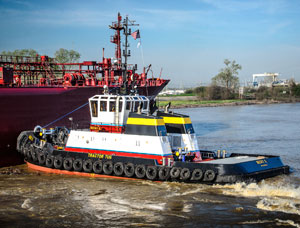 |
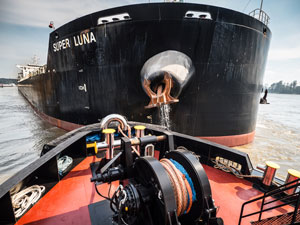 |
|
|
The Bisso z-drive Becky S. is put through its paces as it assists the tanker Clipper Orion on the Mississippi River. |
Bisso’s Liz Healy moves around the bow of the bulk carrier Super Luna at the Zen-Noh Grain Terminal at Convent, La. |
Having accepted their individual responsibility, the crews have protected themselves, their families, their co-workers and the community. Temperature screenings are conducted on every crew change and mooring shift, and personal protective equipment is available.
At the beginning of the pandemic, the tug crews were asked to maintain their normal work schedules and to maintain family-type units for a further measure of safety. Tug visits are limited, and when mechanics or technicians need to come aboard, they are required to submit to a temperature test, maintain social distancing, avoid common areas and fill out a health questionnaire.
As the country moves through the various phases of reopening the economy, New Orleans’ tug companies, pilots and port personnel are keeping maritime employees and the community safe while ensuring that commerce keeps moving on the Mississippi.

